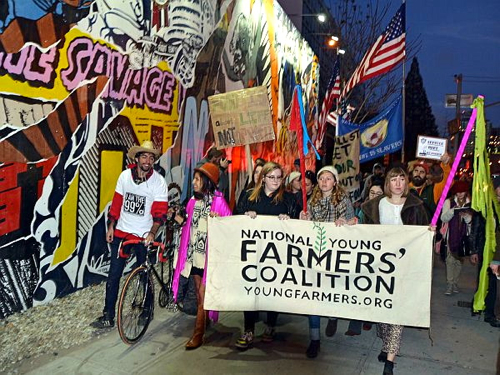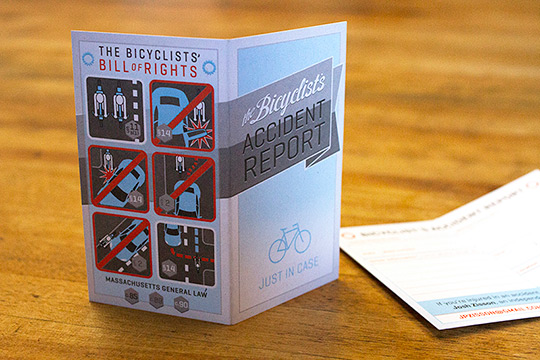2011 was a big year for food politics. In case you dozed off anywhere along the way, I’ve collected the year’s most important stories below. (Want something lighter? See my Sustainable Food Trends story from last week. Want something heavier? Here’s the bad food news.)
1. Urban farming is flourishing.
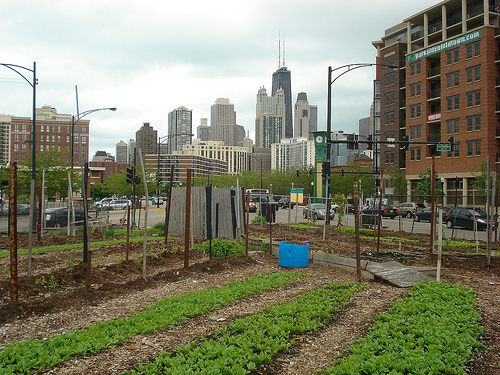 An urban farm in Chicago.Photo: Piush DahalWhile the renewed interest in growing food within city limits is nothing new, 2011 was the year urban farming went legit.
An urban farm in Chicago.Photo: Piush DahalWhile the renewed interest in growing food within city limits is nothing new, 2011 was the year urban farming went legit.
Despite several low points involving criminal charges for gardeners in Michigan and Tennessee (charges were dropped in both cases after word spread around the internet and people from across the country petitioned lawmakers), the year was full of highlights. In San Francisco, Oakland, Chicago, San Diego, and Baltimore, city officials changed local laws to make it easier to farm. Meanwhile, New Yorkers celebrated the first year of legal beekeeping. And creative, scrappy projects like the Boston Tree Party and Detroit’s Growing Joy Community Garden flourished.
Meanwhile, corporate interests are also keying into the possibilities of urban agriculture. We heard from a vertical farming expert on the subject.
2. Young farmers make noise.
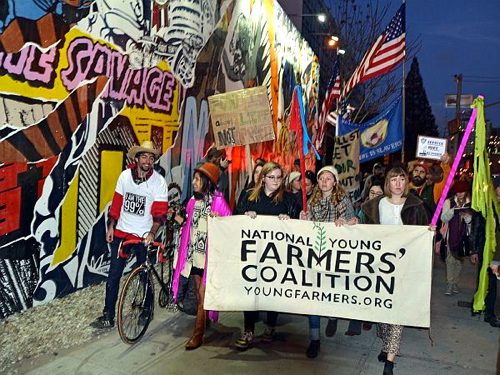 Photo: Eddie CrimminsMore and more young Americans are taking to the farm, a trend that’s continued to grow this year. They’re getting creative — returning to using draft horses, for example. And they’re getting political — the National Young Farmers’ Coalition has put together an agenda for the upcoming 2012 farm bill, pushing for easier to access land and loans. LGBT farmers (young and otherwise) are also changing the face of farming.
Photo: Eddie CrimminsMore and more young Americans are taking to the farm, a trend that’s continued to grow this year. They’re getting creative — returning to using draft horses, for example. And they’re getting political — the National Young Farmers’ Coalition has put together an agenda for the upcoming 2012 farm bill, pushing for easier to access land and loans. LGBT farmers (young and otherwise) are also changing the face of farming.
3. Local food isn’t just delicious and eco-friendly.
2011 presented us with even more evidence that local food systems don’t just taste good and feel good; they also build local economies. More farmers markets mean more jobs, overall.
4. Food Day makes a comeback.
Although the organizers called this year’s national event the first annual Food Day, there had apparently been another attempt in the 1970s. Let’s hope this versions sticks. Check out our slideshow.
5. We don’t need industrial ag to feed the world.
Feeding the world doesn’t have to depend on genetically modified rice like this.Photo: BASFYes, the world’s population is growing rapidly (see Grist’s series “What to expect when you’re expanding“), and the question of how to feed all 7 billion of us is an important one. Far too often, however, “feeding the world” has become code for farming with as many chemicals and GMO seeds as possible.
This year brought mounting evidence to the contrary, including a study published in Nature and another published in Science that say otherwise. The results of a long-term study by the Rodale Institute also proved that organic farming is just as productive as conventional, and better at building soil (this is key, since “yield” is at the heart of the “feed the world” discussion).
6. Despite the influence of the ultra-consolidated meat industry, the “ag-gag” bills went nowhere.
Early on in 2011, lawmakers in Florida, New York, Iowa, and Minnesota tried to pass so-called “ag-gag” bills that would have made it illegal to produce — and in Minnesota to possess — undercover videos of livestock factory farms. The bills were part of a coordinated effort by Big Ag, but the sustainable food movement organized to defeat them, and, in a rare win, succeeded.
7. Eaters are (a little) more aware of the people behind their food.
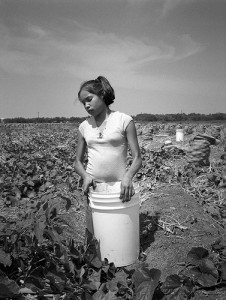 Photo: U. Roberto RomanoThe situation for workers in the food system isn’t exactly good news, but I’m putting it in this category because 2011 saw a number of small but important strides.
Photo: U. Roberto RomanoThe situation for workers in the food system isn’t exactly good news, but I’m putting it in this category because 2011 saw a number of small but important strides.
Food service provider Bon Appétit Management Company took two big steps: First, it released the first comprehensive report on documented farmworker rights and abuses in years. Then it hosted TEDx Fruitvale: Harvesting Change, an event entirely dedicated to the plight of farmworkers and other food system workers.
Meanwhile, food worker advocates produced a guide to restaurants that treat their employees well. And the Department of Labor proposed new child labor rules for farms, expected to be officially enacted next year.
8. Food access got more attention.
Too many people around the U.S. still lack easy access to good, healthy food. Fortunately, activists and farmers made a lot of creative progress this year in helping to raise awareness and tackle the root problems.
A group of advocates from an Oakland-based organization called Live Real took to the road for the Food and Freedom Rides.
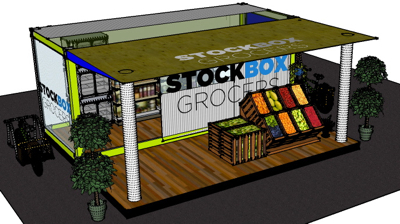 Tiny groceries made out of shipping containers: one way to increase food access.Fifty young people began working in schools, gardens, and advocacy organizations as part of the first class of Food Corps participants. We spoke with three of them.
Tiny groceries made out of shipping containers: one way to increase food access.Fifty young people began working in schools, gardens, and advocacy organizations as part of the first class of Food Corps participants. We spoke with three of them.
Subsidizing farmers markets was shown to be an effective strategy for getting more healthy food into food deserts. And farmers themselves looked for creative ways to address food access, such as this give-a-dozen-buy-a-dozen program modeled after Toms Shoes.
Slow Food USA sought to show that supporting local farmers doesn’t require going broke with its $5 Challenge. And a group of grad students tried out a model for small, portable grocery stores built out of shipping containers — a potential solution for under-resourced areas without traditional grocery stores.
9. More information helps eaters make better choices.
 Photo: Frank FarmAlthough food safety continued to be a huge concern (see our “bad news” list in part 2) some food choices were made a little easier in 2011.
Photo: Frank FarmAlthough food safety continued to be a huge concern (see our “bad news” list in part 2) some food choices were made a little easier in 2011.
For example, organic chicken was proven to carry significantly lower salmonella risk, there’s more evidence that organic milk is better for you,
As it turns out that most “use-by” dates are meaningless.
10. The Occupy movement adds fuel to the fire.
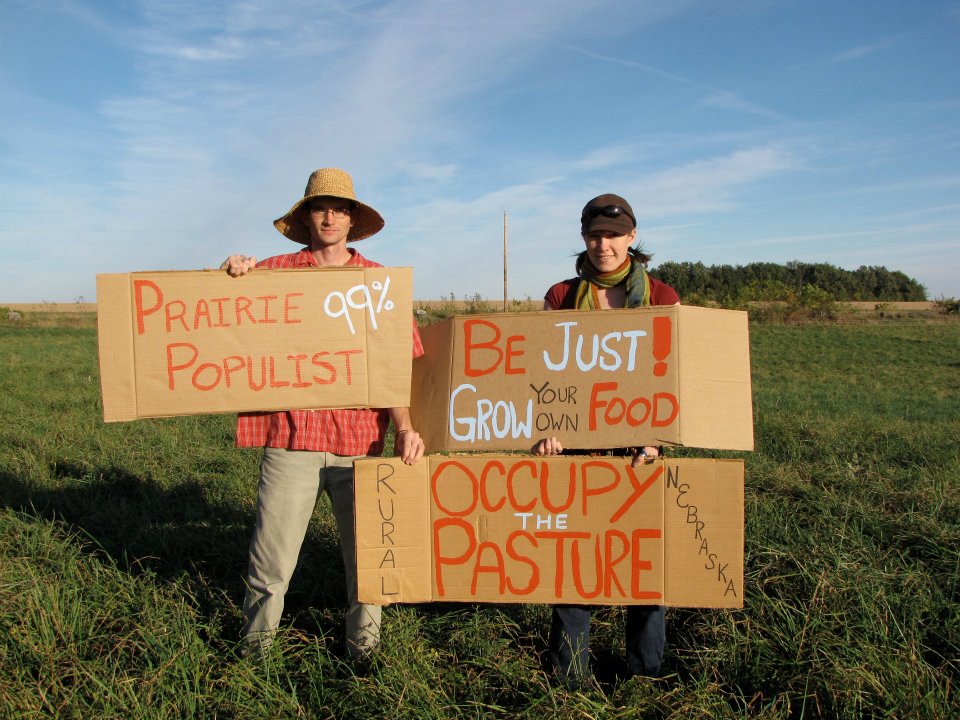 Advocates and farmers jointed the Zuccotti Park gathering this fall, and we heard from a variety of folks who were occupying various aspects of the food system — like one farmer who occupied the pasture.
Advocates and farmers jointed the Zuccotti Park gathering this fall, and we heard from a variety of folks who were occupying various aspects of the food system — like one farmer who occupied the pasture.
Just as important as any march or rally, however, the activism taking place over last few months has gotten more eaters to think critically about where their food dollars are going, and to consider investing in local and sustainable food enterprises rather than Wall Street.
Coming up next: The bad food news of 2011.
